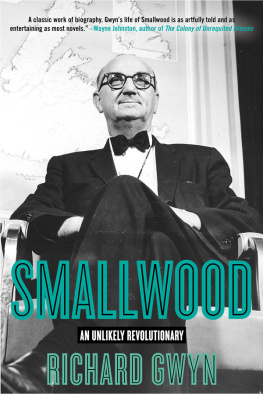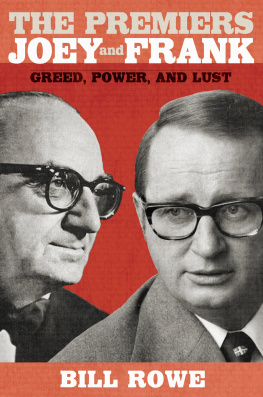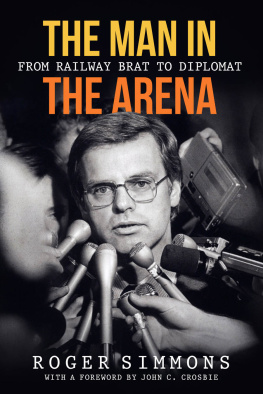Ray Argyle has worked in journalism and public relations and is the author of three biographies, a history of Canadian political campaigns, and a novel set in Victorian Canada.
He has served as a member of the Board of Trustees of The McMichael Canadian Art Collection, Kleinburg, Ontario, and the Scarborough (Toronto) Board of Education. He is secretary-treasurer of the Foundation for the Advancement of Canadian Letters (FACL) and is the only Canadian to have been elected a Fellow of the International Public Relations Association.
Ray has contributed to a variety of publications, including The National Post , Canadas History (formerly The Beaver ), and Readers Digest . His website is www.rayargyle.com . He lives in Kingston, Ontario.
2
The idea of becoming a reporter for the New York Evening Call , the famous Socialist organ, had blazed in Joey Smallwoods brain almost from the moment of landing his first newspaper job in St. Johns. Yes, he wanted American experience that would help him when he got back home but most of all, it was his dream to be part of the great Socialist movement that he believed, as an idealistic youth, held the answers to all the problems of mankind.
The train from Boston disgorged its passengers at Grand Central Station, a confusing enough place for even the most blas travellers to New York. For a nineteen-year-old from Newfoundland, the noise and congestion of the crowded station might have been enough to cause panic, but Joey revelled in the movement of commuters and the shouts of ticket agents and assorted peddlers. He made his way triumphantly through the concourse and, on reaching 42nd Street, decided he would to try to walk all over Manhattan.
Joey found his way to the offices of the Call , in a dingy loft of an old downtown factory building. He was desperate for a job, not only to fulfill his dream but because he was paying the way for a Newfoundland friend hed roomed with in Boston, Andrew Lehr. Hed insisted on coming with him to New York and Joey was already running low on money. The city editor of the Call was a crusty one-time book editor named Louis Baury. Whether he took pity on Smallwood, or saw in him an ardent young Socialist who would produce the kind of copy favoured by the papers owners, the Workingmans Cooperative Publishing Association, he hired him on the spot.
As Joey wandered through the newsroom, one of the first men he met was a fellow Newfoundlander, also from St. Johns. Gerald Fitzgibbon turned out to be a man of many talents he was a hypnotist-magician, a cross-country runner, and a great Socialist stump speaker at rallies held in New York parks. One day, Fitzgibbon invited Joey and other newsmen to come to the East River to witness a daring feat. He had himself bound in chains, sealed in a canvas bag, and thrown into the water. My God, Gerry, Joey exclaimed, suppose you dont come up? But within a couple of minutes, Fitzgibbon did come up, and he garnered much publicity for his accomplishment.
New York in 1920 was on the verge of the greatest economic boom in American history. The decade that would become known as the Roaring Twenties would end in the stock market crash of 1929 and open the way to the Great Depression of the 1930s. All that was in the future, however, and the editors of the Call were struggling to keep their paper going. Its circulation was dropping like a stone and was down to twenty thousand a day when Joey was hired. The Calls anti-war stance had cost it its second-class mailing privileges in 1917, making subscriptions prohibitively expensive. As well, the country was caught up in anti-Communist hysteria following the Russian Revolution, and anything that smacked of communism or socialism was suspect.
On May Day, 1919, a mob of veterans inflamed by the Red Scare had barged into the Calls offices, burnt books and pamphlets, and beaten up seven members of the staff. The great Eugene Debs, Socialist Party candidate for president in 1920, was in jail for opposing the wartime draft and had to campaign from behind bars. He collected nearly a million votes, but a Republican, Warren G. Harding, was elected on the promise of a return to normalcy after the sacrifices of war. Americans were rapidly losing interest in socialism, convinced that the rising stock market promised prosperity for all a chicken in every pot and a car in every garage.
Joey Smallwood was sent to interview a medley of interesting newsmakers: capitalists and labor union organizers, artists and writers, advocates for black equality, and crusaders for freedom of speech. He was in the crowd, notebook in hand, at Madison Square Garden the night Eugene Debs addressed twenty thousand roaring supporters following his release from prison. Joey became familiar with Harlem, the New York district where blacks had been settling for the past twenty years. He felt comfortable in their midst, and it was there he met Marcus Garvey, who would become famous for his futile efforts to encourage blacks to return to Africa. Many black leaders shared Garveys view that Africa offered a better future for their race than any that might be found in America. Joey wrote of Garveys plan to set up a Black Cross Steamship Line that would facilitate such a migration. Garvey had managed to purchase a boat that he moored in the East River, where he charged a dollar to go aboard and look around. Thousands did, but no ship of the Black Line ever sailed to Africa. Joey thought Garvey to be one of the most dynamic people hed ever met, but ahead of his time.
Joeys colleagues at the Call were an eclectic lot. He arrived too late to meet John Reed, author of Ten Days That Shook the World , a book on the 1917 Russian Revolution . Among the staff who addressed one another as Comrade, Joey especially enjoyed the fellowship of Richard Rohman a promising young playwright and Philip Hochstein, who would become a powerhouse in one of Americas biggest newspaper chains. There was no class distinction at the Call , and Joey spent his leisure hours with his comrades eating at economical restaurants like The Three Steps Down and, on occasion, the more costly Caf Royale.
After little more than a year in New York, Smallwood felt the urge to go home. He took a leave of absence from the Call late in 1921 and headed back to St. Johns with his friend Andrew Lehr. The House of Assembly was in session, and Joey covered the debates for the St. Johns newspapers. Early in the New Year, he talked his way into a free trip to New York on the tramp steamer Yankton . Joey recalls in his memoirs that, with nothing to do but read, he devoured Theodore Dreisers Sister Carrie , Gustave Flauberts Madame Bovary , and Herman Sudermanns Song of Songs all having the same theme of women seeking escape from narrow, provincial lives.
Back in New York, Joey decided his talents deserved a better outlet than the Call. Charles R. Miller, the editor-in-chief of the New York Times , had vacationed in Newfoundland a couple of years before, at which time Joey had interviewed him. Miller had liked the story so much he ordered a dozen copies and gave Joey a fulsome letter of introduction. Joey took the letter to Carr van Anda, managing editor of the Times , who told him, Young man, do you realize how fortunate you are to have a letter like this from Mr. Miller? Van Anda said the paper had a waiting list of a thousand applicants, but promised Joey he could start work in a few weeks.
The few weeks of idle waiting brought Joey to his lowest point in New York. He could no longer afford his six-dollar-a-week rooming house. Leaving his belongings for safekeeping, he struck out with a razor and the clothes on his back, spending several nights at a fifty-cent flop house. Deciding he couldnt afford even that, he found something cheaper a place near the Bowery where one floor had been divided into cubicles by chicken wire. There was no privacy, and tenants were kicked out at seven oclock in the morning. Joey would go to a public washroom, find a cheap caf for a ten-cent breakfast, and wait for the opening of the public library.













